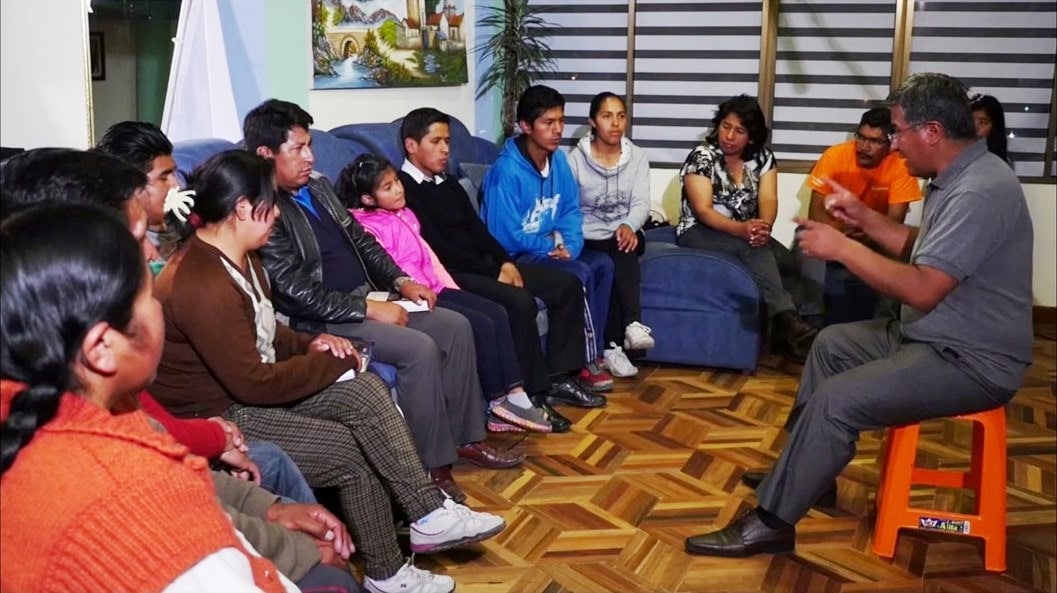
Edgar Ramos, 44, is a businessman and member of the Cosmos Seventh-day Adventist Church in El Alto, near Bolivia’s capital city of La Paz. One day, along with his wife Felipa, the couple decided to make changes to their lives as church members to become more active in sharing their beliefs.
Six years ago, the Ramoses committed to a small group ministry they called Ramber. Small group ministries encourage members to meet in homes in groups of usually no more than twelve people to fellowship and study the Bible together. When a group becomes too large, its members usually agree to split in two and start anew.
![Ramber, the small group ministry launched by Edgar y Felipa Ramos six years ago, has multiplied in such a way that so far, 55 people have been baptized. [Photo: South America Division News]](https://adventistreview.org/wp-content/uploads/2022/01/grupo-ramber.jpg)
In a recent conversation with South American News Agency (ASN), the Ramoses reported that since launching their ministry, Ramber has multiplied six times. “So far, 55 people have been baptized,” they said.
One of the persons reached by the Ramoses small group ministry is Emérita Alanoca, who came to the Ramber group after attending the El Alto Living Health Center of Influence. The center opened a few months ago in La Paz as another outreach initiative of the Ramoses.
“For some time, I had been praying to God to show me which is the true day of rest,” said Alanoca. “One day, one of my friends invited me to the center of influence.”
When Alanoca learned that the healthy cooking and sewing courses were free, she felt encouraged to enroll. “[Organizers] invited me to attend not only the courses offered at the center but also their small group,” she said. “It was the place I was looking for, and I liked it because it was different from any other place I had been to.”
The Ramber small group reports that six years after its launch, 90 percent of those who enrolled are attending an Adventist Church, and many of them have become not only members but also leaders in their local congregations.
According to the Ramoses, the group has three secrets to success: First, they emphasize that their group is all about people taking care of people. It means that befriending visitors also includes becoming part of their daily lives. Secondly, they make a point of including the visitors’ relatives and friends in the invitation to join their small group. And finally, they emphasize fellowship, by putting together a quarterly social celebration for the members of the group.
The Ramoses understand that for a small group to multiply, it needs to be strong, mature, and productive. For Felipa it’s as simple as this: “Friends bring other friends,” she said. Thus, the group has applied this principle, inviting friends who bring other friends. And their goal is to go beyond supporting individuals. “In our small group, we work with families,” said Edgar. “And our goal is for every member of a family ultimately to ask to be baptized.”
The story of the Ramber small group ministry was featured at a special service at the South American Division church region headquarters in Brasilia, Brazil, last June 6. The “Multiplying Hope” event offered Adventist leaders across South American a training session on how to multiply small groups. The initiative was shared through a Novo Tempo—the Hope Channel South America TV network—live broadcast, in preparation for an August 5 small group ministry multiplying event throughout the region.
For Everton Donato, Personal Ministry leader and small group coordinator in eight South American countries, “the challenge is to train more leaders, more disciples, and more ministers.” Donato said it is the reason leaders are planning a triple celebration on August 5. “We are inviting every small group leader and church member to get involved in this initiative,” he said.
Data from the Seventh-day Adventist Membership System reveal that so far, the Adventist Church in the South American church region has more than 73,000 active small groups. “The goal for this year is to add at least 7,000 to reach 80,000 small groups in the territory,” leaders said.